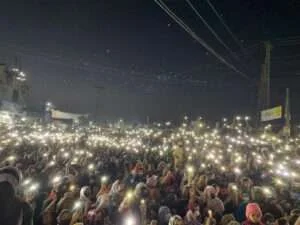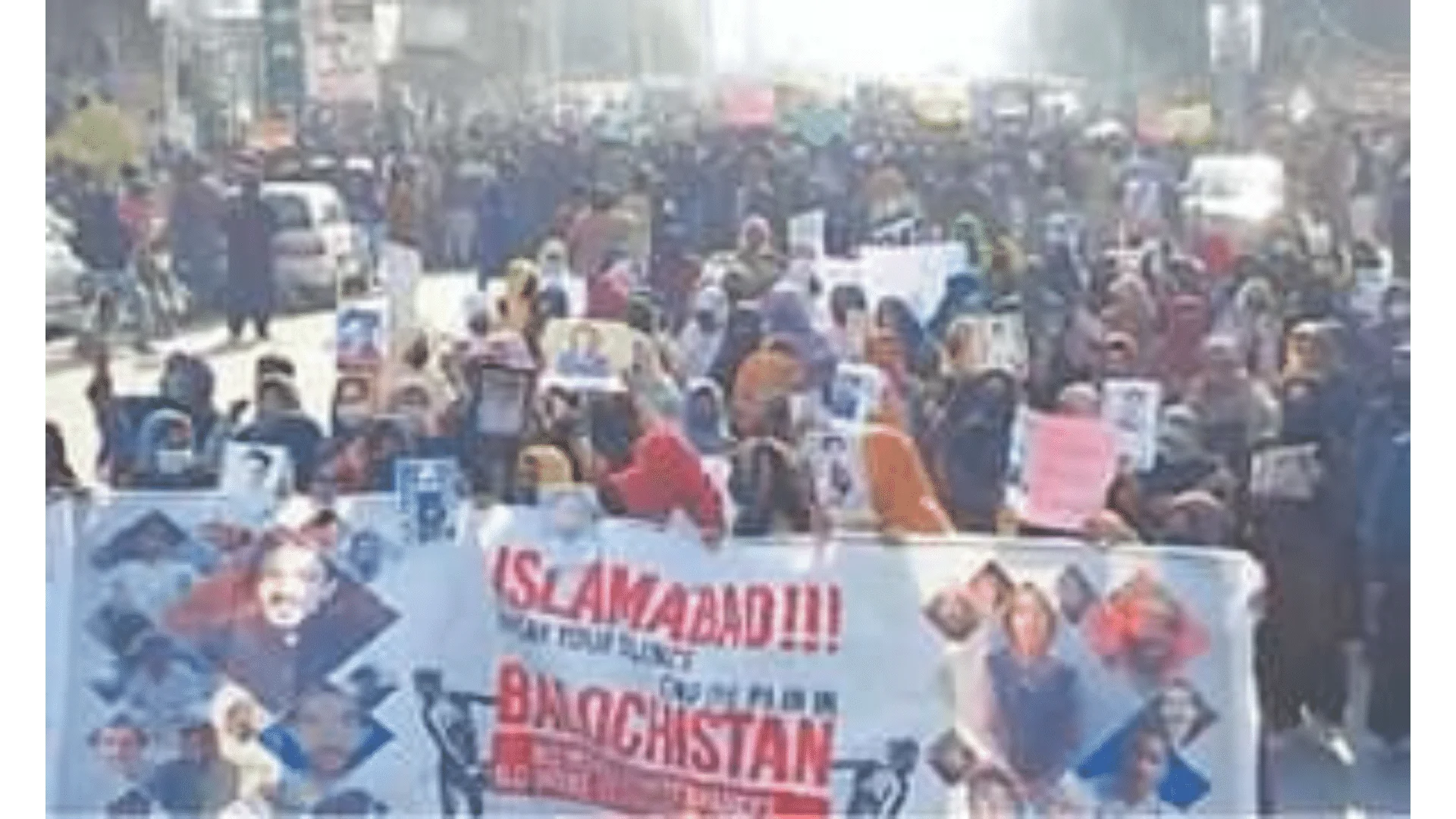Mahrang Baloch March
There is not a single issue in the country that so outspokenly reveals one’s political stripes as the plight of Balochistan. This truth was brutally etched this past Wednesday night, when tides of peaceful protesters, traveling from Turbat to Islamabad, were denied entry at the capital’s gates.
A Cry for Justice and Recognition in a Fractured Nation
Weeks before, the Long March now known as “Mahrang Baloch March” had stirred waves of empathy. Thousands of women, men, children, activists, and everyday citizens snaked through Balochistan, then through the Seraiki, Pakhtun, and Punjabi heartlands.

The Long March: A Resonant Expression of Unity and Democratic Aspiration
Led by a young woman, Mahrang Baloch, this caravan was the most resonant expression of democratic ideals and a possible, voluntary federation Pakistan hadn’t witnessed in years. And then, they reached Islamabad’s threshold. The demands resonated with their simplicity ending enforced disappearances; the encounter killing that sparked the protest in Turbat, and accountability for those complicit.
The Plight of Balochistan: A Stark Divide in Pakistan’s Political Landscape
Petitions whispered, but their echoes could topple mountains Why is voicing such pleas so taboo? Why, particularly, for the youth of the province articulate what most Pakistanis already whisper that some functionaries operate with impunity? Their language was not seditious; it was a desperate cry to be heard.
It’s telling that while the march traversed the country, mainstream parties were busy courting Balochistan’s electable; Sarfraz Bugti, the caretaker interior minister who promptly joined the PPP after resigning upon the February 8th election announcement.
Islamabad’s Denial: A Betrayal of Democratic Principles
Even the caretaker Prime Minister hails from Balochistan. His urgent notice after the crackdown, along with the Islamabad High Court’s intervention after a petition on behalf of the detained, begs a crucial question: why are they subjected to repeated brutality, followed by tokenistic action only after salt stings their gaping wounds?
Indeed, the scenes outside Islamabad this week make it harder to convince skeptics that a democratic federation with genuine citizenship for ethnic nations like the remains a possibility. The actions and attitudes of those in power can only be described as old-fashioned colonial statecraft.
These marchers merely sought entry to the capital, a platform to speak their truth. Their words weren’t incendiary; they were a plea for recognition. Given history’s cruel precedent, their expectations weren’t lofty. Yet, these young women and mothers who walked to the symbol of this federation, asking only to protest peacefully, were met with batons, water cannons, and police vans.
Mainstream Pakistan has experienced some of these tactics in recent months, particularly those loyal to the imprisoned former PM. Many now taste the bitter fruit of state brutality and ask why they face such treatment.
Islamabad’s Denial: A Betrayal of Democratic Principles
The solidarities forged along the Long March’s path shouldn’t be forgotten amidst the din of Islamabad’s denial. The establishment won’t be held accountable by cozying up to bourgeois politicians. The only hope lies in the unity of progressives and ordinary citizens who stand against disappearances and encounter killings to believe that, perhaps, just perhaps, this path can still lead to a just and democratic future.
The Brutality and the Tokenism: A Pattern of Injustice
They now experience what many Baloch people and their allies have endured for far too long. Recognizing this is the first step towards a deeper democratic struggle, where the most oppressed voices take center stage.
Beyond Balochistan: A Ballad for a Fractured Nation
Ballad or epic story isn’t just about Balochistan; it’s about reclaiming the soul of a nation fractured by injustice. It’s about the courage of young women leading the charge, the unwavering solidarity of diverse communities, and the yearning for a future where all voices are heard, respected, and protected.
Listening to the Cries for Equality: Building a Just Pakistan
The Balochistan question is not a political swamp; it’s a human cry for equality, echoing from a land bordered by mountains and broken by unhealed wounds. It’s time we listened, truly listened, and built a Pakistan where everyone can walk freely, speak openly, and find justice even on the coldest, darkest nights.
FAQs
- What is the Mahrang March and what are its demands?
- The Mahrang March is a peaceful protest from Turbat to Islamabad, led by a young woman, Mahrang Baloch demanding an end to enforced disappearances, the accountability of those involved in the Turbat encounter killing, and a more just and democratic federation for Pakistan.
2. Why are the protesters denied entry to Islamabad?
- The official reason is unclear, but it seems to be due to the government’s unwillingness to confront the sensitive issue of human rights violations in Balochistan and their desire to maintain control over the narrative.
3. What does this march tell us about the political landscape in Pakistan?
- The Mahrang Baloch March exposes a stark divide in Pakistani politics, with some factions prioritizing power and maintaining the status quo, while others advocate for social justice and the rights of marginalized communities.
4. What can be done to address the issue of human rights violations in Balochistan?
- The article emphasizes the importance of solidarity with the Baloch people and holding the government accountable through non-violent means like protests and legal action. Building bridges with diverse communities and listening to their experiences is also crucial.
5. Does Mahrang Baloch March offer hope for a better future in Pakistan?
- Despite the brutal denial at Islamabad, the Mahrang March highlights the courage and resilience of young people demanding change. It signifies a growing demand for justice and the potential for a more inclusive and democratic Pakistan if people stay united and continue to raise their voices.


